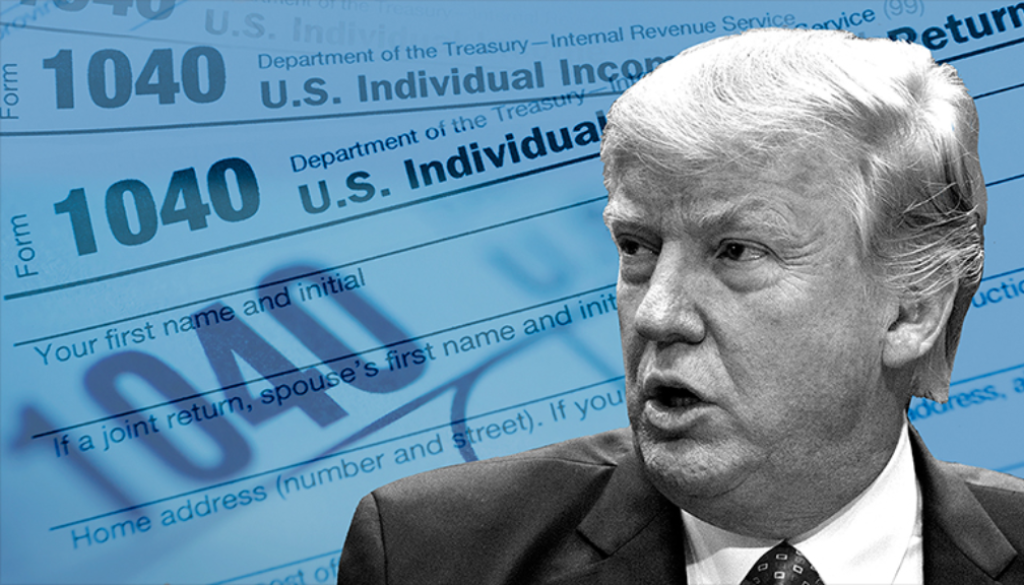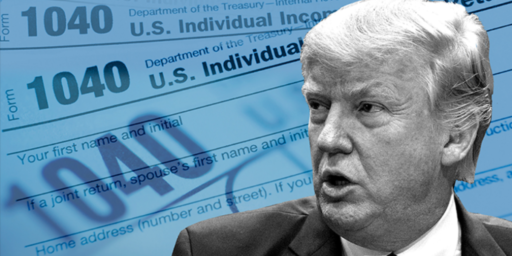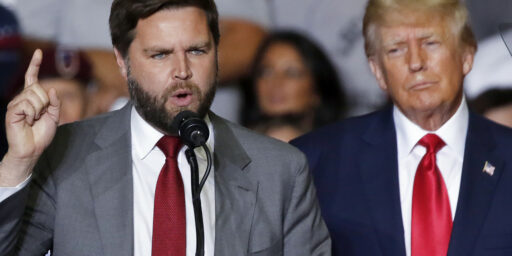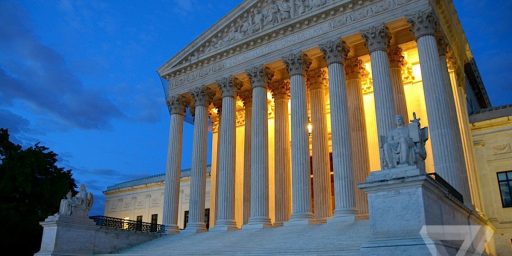Trump Loses Lawsuit To Block Subpoena For His Tax Returns
A Federal Judge rejected the President's effort to block a New York City prosecutor from obtaining copies of his tax returns.

A Federal District Court Judge in New York City has rejected the President’s efforts to block the District Attorney of Manhattan from obtaining copies of his tax returns but the matter remains on hold thanks to a stay issued by the Second Circuit Court of Appeals:
A federal judge on Monday dismissed President Trump’s lawsuit seeking to block the Manhattan district attorney from obtaining the president’s tax returns as part of an investigation into hush-money payments during the 2016 campaign.
That decision does not mean Trump’s tax returns will be handed over immediately. Trump appealed within minutes, and an appeals court put the case on hold until it can hear the president’s challenge.
But Monday’s ruling by U.S. Judge Victor Marrero was still a broad rejection of Trump’s precedent-shattering argument in this case.
The president argued that, as long as he is president, he cannot be investigated by any prosecutor, anywhere, for any reason.
Marrero said that was “repugnant” to an American ideal as old as the Constitution: that no man, even a president, is above the law.
“The Court cannot square a vision of presidential immunity that would place the President above the law with the text of the Constitution, the historical record, the relevant case law” or any other authority, Marrero wrote.
“This Court cannot endorse such a categorical and limitless assertion of presidential immunity from judicial process,” he wrote in another section of his 75-page ruling.
(…)
The lower court decision marked a key setback for Trump, who has taken an unorthodox, aggressive approach to fighting off investigations from prosecutors and congressional committees seeking his tax returns and financial documents. He has sued the investigators and the companies they subpoenaed, including his longtime accounting firm Mazars USA and two of Trump’s banks.
Judges have ruled against Trump twice in other cases, but those lawsuits are still tied up in appeals in New York and Washington, and the subpoenas have not been enforced.
In this lawsuit, Trump said Manhattan District Attorney Cyrus R. Vance Jr. (D) did not need eight years of his tax returns to examine whether any laws were broken by the 2016 payments. He called the subpoena to Mazars “a bad faith effort to harass the President by obtaining and exposing his private financial information, not a legitimate attempt to enforce New York law.”
The judge’s opinion Monday raised the prospect that by seeking to vastly expand his immunity from prosecution, Trump may wind up undercutting the immunity he already enjoyed.
The Justice Department has previously declared that presidents cannot be indicted by federal prosecutors, relying on a series of legal memos from White House lawyers going back to the 1970s.
In this case, Trump had sought to turn those protections into a more far-reaching legal shield. Citing those memos, he asserted he should have immunity not just from indictment but also any sort of investigation — and not just from federal prosecutors, but local prosecutors like Vance, too.
But Marrero, nominated to the bench in 1999 by President Bill Clinton, rejected both arguments — and also questioned the Justice Department memos they relied on. He wrote that the arguments they made rely on “conjurings of remote prospects and hyperbolic horrors” and that — in some cases — indicting a president may be worth the cost.
(…)
At the 2nd Circuit, a clerk ordered that the subpoenas be put on hold until judges could hear the arguments in an expedited proceeding. Both the president and Vance’s office asked the court to quickly schedule oral arguments to happen before the end of the month.
The president’s lawyers pressed for speedy review by the appeals court in part because of time constraints. The district attorney had agreed to stay the subpoena only until 1 p.m. Monday, and Vance would have been allowed to enforce the order had the appeals court not acted.
In contrast, in the two pending cases involving congressional subpoenas for the president’s financial records, lawyers for the House have agreed to put those orders on hold until the appeals are resolved.
Shortly after the District Court issued its ruling, the President’s private lawyers filed an appeal to the Second Circuit Court of Appeals and sought an immediate stay from that court at least until the matter could be heard on at least a preliminary basis. The fact that the request was granted was not unusual under the circumstances and should not be taken as an indication of which way the Second Circuit might ultimately rule on appeal or on a preliminary application for a more permanent stay, although that is likely to be approved as well if only to preserve the status quo until the matter can be resolved. In any case, both sides have asked the Second Circuit for an expedited hearing on the appeal. If granted, there could be a hearing as early as the end of the month.
This lawsuit is only one of many issues relating to the President’s tax returns pending in courts around the nation. Just last week, for example, a Federal Judge in California blocked a California law that would require candidates for President to provide copies of their tax returns to get on the ballot. Back in Washington, the House Ways and Means Committee found itself locked in a dispute with the Administration when Secretary of the Treasury Steve Mnuchin refused to comply with a law requiring the Internal Revenue Service to provide copies of any person’s tax return to the committee upon request. That dispute is currently pending in a Federal Court in Washington, D.C. after the committee was forced to file a lawsuit to enforce its rights under the law. Finally, earlier in the year New York State passed a law allowing the Ways & Means Committee to seek copies of the state returns of any individual upon proper request, a law that Trump has also sued to block in
The current case is not related to any of those matters. Instead, it involves an ongoing investigation being conducted by Manhattan District Attorney Cyrus Vance, Jr., who happens to be the son of President Jimmy Carter’s first Secretary of State. That investigation is apparently related to the payoffs that were made to adult film star Stormy Daniels and Playboy model Karen McDougal to induce them to remain silent about their past relationship with Trump during the final months of the 2016 Presidential campaign. It is in no small part because of these payments that the President’s former lawyer Michael Cohen sits in Federal prison in a case in which the President was identified as “Individual 1,” effectively an unindicted co-conspirator with Cohen in an effort to evade federal campaign finance laws. Vance is apparently investigating the matter to determine what, if any, New York state laws may have been violated by the payoffs and who could be culpable under those laws.
In his initial lawsuit, Trump and his lawyers made the argument that Vance was precluded from obtaining copies of the tax returns because the same argument(s) that support the position that a sitting President cannot be criminally indicted also mean that he cannot be investigated as part of a criminal proceeding. By putting forward this argument the President’s lawyers may have bitten off more than they can chew, especially if the manner in which Judge Marrero reacted to the argument. In his more than 70 page opinion, the Judge categorically rejects the idea that a President cannot be criminally investigated as adopting a view of the Presidency that, he argues, goes far beyond the powers and protections provided by Article II of Constitution.
As noted above, Marrero calls the view that the President is immune from investigation to be “repugnant” to the Constitution. What is important is that he does so in a manner that also could logically be applied to the entire argument that the President is immune from criminal indictment while in office. This argument that has been accepted as settled law since the Justice Department’s Office of Legal Counsel first looked at in the wake of the Watergate scandal and then revisited in the 1990s while President Clinton faced charges of perjury in the context of a Federal civil lawsuit that eventually led to his impeachment in 1998. Based on Marrero’s reasoning, though, the question then becomes why there should be a legal bar on a President being indicted during the course of his Presidency.
This ruling is significant because it is the first time that this argument has ever been tested in court. That being said, it’s unclear whether it will withstand appeal, especially since one can make the argument that it is possible to make a ruling on the underlying issue of whether or not Vance has the right to subpoena the tax returns without reaching the broader issues that Marrero touches upon in his opinion. That, of course, will depend on how the case proceeds in the Second Circuit and, potentially, the Supreme Court. Until then, this case stands as a strong counterargument to the idea that being President essentially places someone above the law. For that reason alone, it’s a positive development.
Here’s the opinion:
Trump v. Vance Et Al Order by Doug Mataconis on Scribd





I am reliably informed by Jay Sekulow that yesterday was a big win for Trump.
Briefs due 10/21 (I think, may be 10/27) so yeah, super expedited briefing schedule.
@Pylon: So much winning, I’ll bet he is heartily sick of it.
“Congratulations, Mr. President, or Mr. trump. Here’s your license to steal, your license to murder, your license to deal drugs, your license to commit fraud, your license to kidnap for ransom, your license to rape -Oh, what the hell! Just take them all! Do whatever you want. Enjoy! Just don’t forget to issue yourself a pardon before your term is up!”
Because it’s not reductio ad absurdum if the absurdum is presented as a premise.
True. But I wish I had some confidence the current Supreme Court wouldn’t do something foolish.
“The president argued that, as long as he is president, he cannot be investigated by any prosecutor, anywhere, for any reason.”
Republicans will support this, as long as Trump is president. Once a Democrat is elected to the office expect to hear a lot mumbling about the Constitution, no one is above the law, we dont have royalty, etc.
Steve